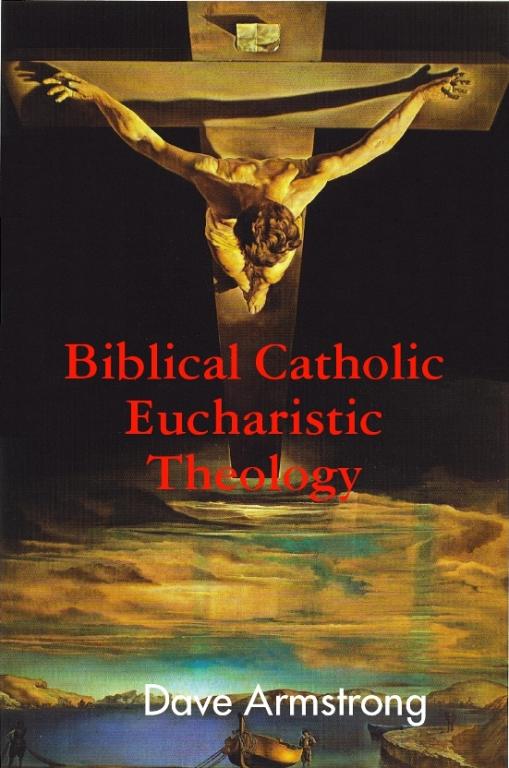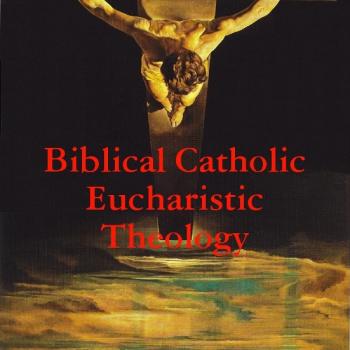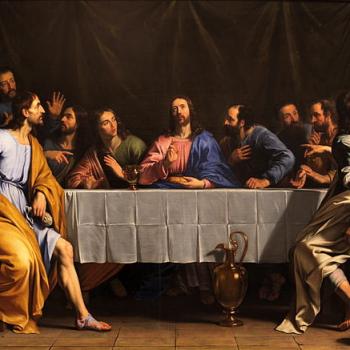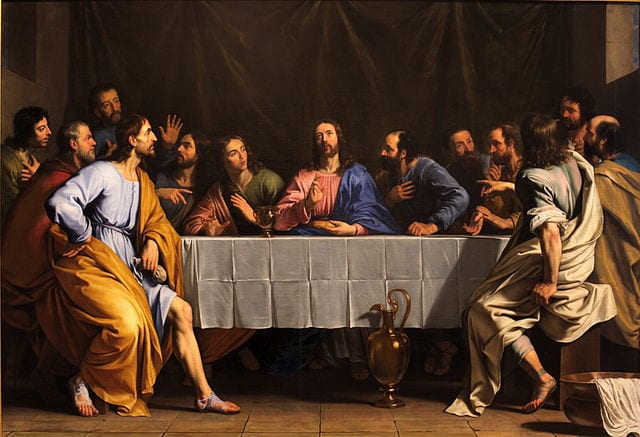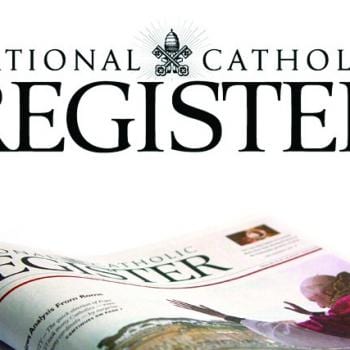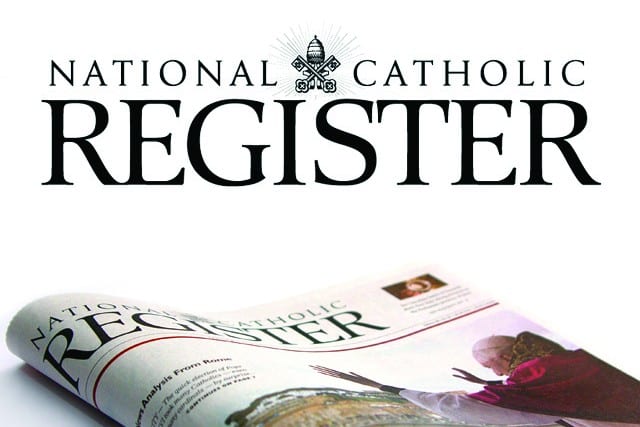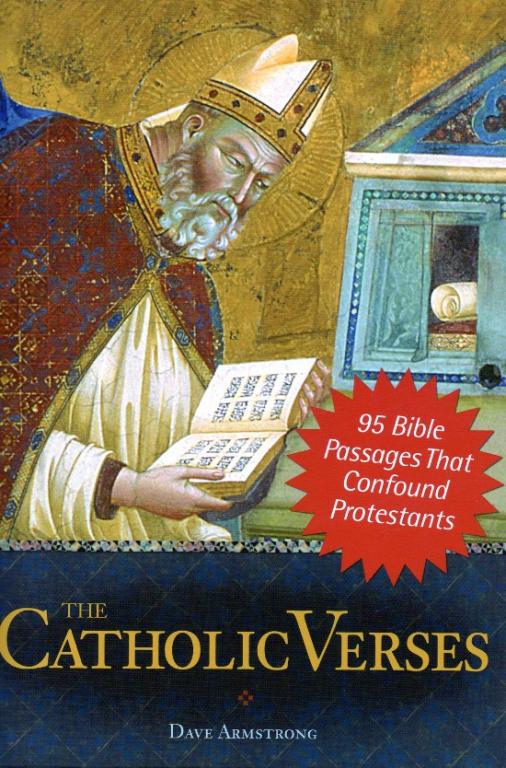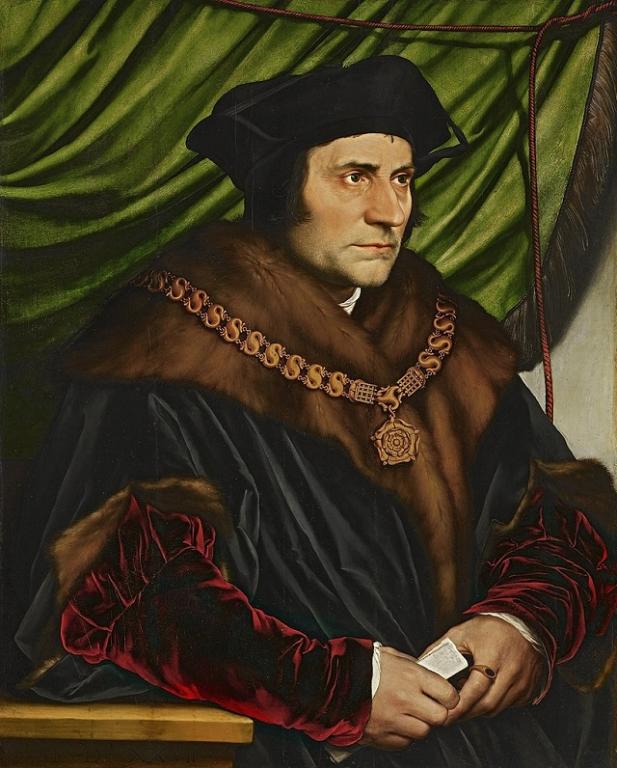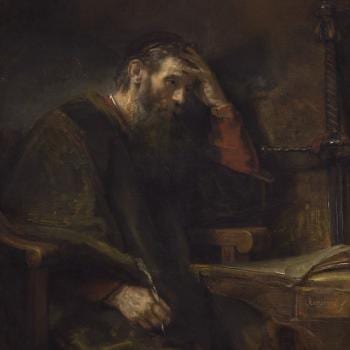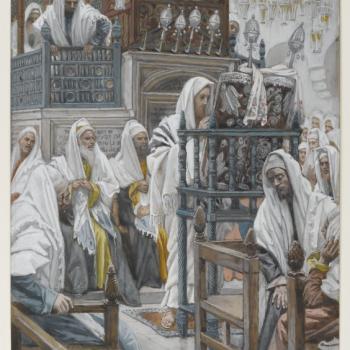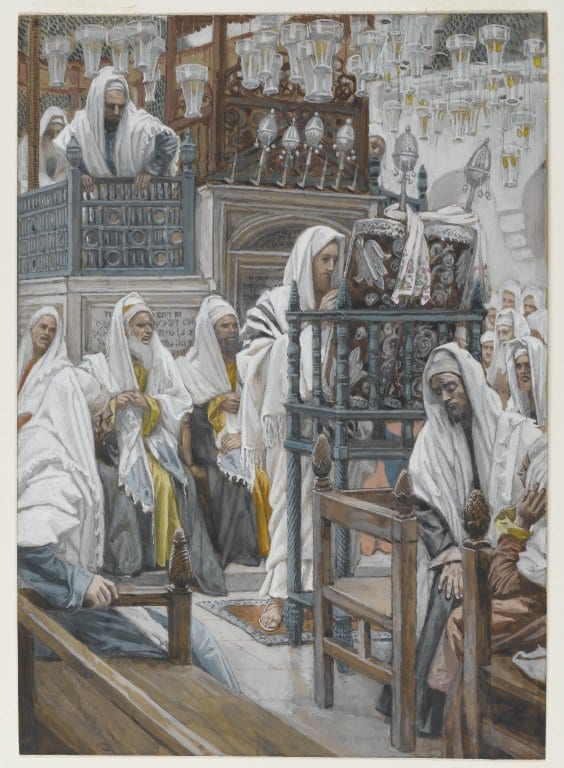
Dr. Mark Miravalle holds the St. John Paul II Chair of Mariology at Franciscan University of Steubenville, and is Professor of Mariology at Ave Maria University. He is the President of Vox Populi Mariae Mediatrici, which seeks the solemn papal definition (at the highest dogmatic level) of the Spiritual Maternity of the the Blessed Virgin Mary, as Co-Redemptrix, Mediatrix of All Graces, and Advocate for the People of God.
I’m honored and delighted to host this recent paper of Dr. Miravalle on my blog. I have greatly appreciated and cited his work for over twenty years in several of my apologetic / theological writings on the topic, in defense of the same Marian doctrines (which I will link to below).
*****
In light of Pope Francis’ December 12, 2019 non-scripted, spontaneous comments concerning the traditional Marian title “co-redemptrix,” coupled later with a more vague inference to its proposed dogmatic definition (see National Catholic Register, Dec 23, 2019; La Stampa Vatican Insider, Jan. 8, 2020), a high-spirited worldwide discussion has ensued regarding the legitimacy of this Marian title, and the doctrine which it seeks to identify: namely, the unique human cooperation of the Mother of Jesus with and under Jesus Christ, humanity’s sole divine Redeemer, in the historic work of Redemption.
Most of the global discussion has focused upon the question of the authenticity of the classic Co-redemptrix title, which expresses in a single term the unique human role of Mary in the historic salvation of humanity accomplished by her divine son. What has not been discussed is the proposed rationale for a possible solemn definition or “dogma” of Mary’s role in the Redemption, along with her consequent motherly role as Spiritual Mother of humanity.
The unparalleled role of the Mother of Jesus in the saving work of Jesus Christ indeed already constitutes the authoritative doctrinal teaching of the Church’s Magisterium. The Second Vatican Council repeatedly teaches this unique coredemptive role of Mary with and under Jesus, and her consequent intercessory roles as Mediatrix and Advocate for humanity:
…the Blessed Virgin advanced in her pilgrimage of faith, and faithfully persevered in her union with her Son unto the cross, where she stood, in keeping with the divine plan, enduring with her only begotten Son the intensity of his suffering, associated herself with his sacrifice in her mother’s heart, and lovingly consenting to the immolation of this Victim which she herself had brought forth (Lumen Gentium 58).
And again:
She conceived, brought forth and nourished Christ. She presented Him to the Father in the temple, and was united with Him by compassion as He died on the Cross. In this singular way she cooperated by her obedience, faith, hope and burning charity in the work of the Savior in giving back supernatural life to souls. Therefore, she is a mother to us in the order of grace (Lumen Gentium, 61).
St. John Paul II referred to Mary as the human “Co-redemptrix” with Jesus, the only divine Redeemer, on at least seven occasions. The great John Paul would further teach and preach the greatest quality and quantity of the theology regarding Marian coredemption in the history of the Church.
The prefix “co” comes from the Latin word, cum, which in its first denotation means “with” and not “equal.” The title “co-redemptrix” applied to the Mother of Jesus never places Mary on a level of equality with Jesus Christ, the world’s sole divine Redeemer. To place Mary on a divine
level of equality with Jesus constitutes both Christian heresy and blasphemy!
The biblical and the liturgical sources also confirm that the prefix “co” does not predominantly mean equal. St. Paul refers to all Christians as “co-workers with God” (1 Cor. 3:9) but is not teaching that we are “equal workers” with God. The Liturgy refers to Christians as “co-heirs” with Jesus, but is certainly not signifying that we are “equal heirs” with Jesus. Pope St. John Paul II repeatedly called the Catholic faithful to be “co-redeemers in Christ” (e.g., May 8, 1988). Again, “co” signifies “with” and not equal, as it appropriately used biblically, liturgy, papally, and in the Marian title, “Co-redemptrix.”
Again, the Co-redemptrix term applied to Jesus’ human mother denotes Mary’s singular human participation with and under Jesus, the one and only divine Redeemer, in the saving work of Redemption (redimere: to “buy back”) for all humanity. Her subordinate human participation depends entirely upon Jesus’ divine and infinite saving act.
No one shared in the Redemption accomplished by her divine Son more than his human mother. Mary alone was the Mother of Jesus, giving the Word his flesh, the very instrument of our Redemption. (cf. Heb. 10:10). Further and most importantly, Mary alone was the “Immaculate Conception.” Her fullness of grace allowed her to be the perfect sinless partner with her son in the work of the Redemption, and also provided for Mary the opportunity of a perfect human choice, freed from sin, to cooperate with the Redeemer to save souls through a suffering of love united to her Son.
If Mary’s unique role in the Redemption is already an official doctrine of the Church, what then would be the benefit of the Holy Father declaring it as a new dogma?
The following constitute 7 fruits by which the contemporary Church and world would greatly benefit from a solemn definition of Mary as the Spiritual Mother of all peoples (inclusive of her three motherly roles as Co-redemptrix, Mediatrix, and Advocate).
1. Releasing historic graces for the Church and the world: Fully Activating Mary’s Motherly Intercession
During the horrors of World War I, the renowned Belgian Cardinal Desìre Mercier initiated a petition drive to Pope Benedict XV for the dogmatic definition of Mary’s universal mediation. What was Mercier’s rationale for this new Marian dogma? He argued that a solemn declaration of Mary’s roles of intercession would lead to “great graces for the world,” especially the grace of “world peace.” By 1925, over 450 cardinals and bishops, and hundreds of thousands of clergy and faithful had sent petitions to Popes Benedict XV and Pius XI in support of the Marian proclamation.
Also in the 1920’s, St. Maximilian Kolbe joined his strong support to his international Army of the Immaculate. Three papal commissions produced over 2500 pages of theological support for the new Marian dogma. Theological defense for the Marian doctrines of Co-redemptrix and Mediatrix of all graces dominated the Mariology of the 1940’s and 1950’s. Although Pope St. John XXIII made it clear from the offset of the Second Vatican Council that it would not be a council defining new dogmas (but rather a pastoral council,) the doctrines of Marian coredemption, mediation, and advocacy are nonetheless explicitly and repeatedly taught (again, cf. Lumen Gentium, 56, 57, 58, 61, 62).
Since 1993, over 8 million petitions from the People of God spanning some 180 countries have been sent to the Holy See in support of a fifth Marian dogma. Just in the last 25 years, over 600 bishops and 70 cardinals have joined the People of God in their petition to the Holy See. These millions of faithful and hundreds of prelates generally share the same belief as the movement’s founder over a century ago: this papal proclamation of Mary’s universal spiritual motherhood will lead to a historic release of grace for the Church and for the world. An August, 2019 open letter to Pope Francis by cardinals and bishops representing the six contents requesting the fifth Marin dogma voices precisely the same spiritual conviction (www.openletterformary.com).
What is the theological justification for the expectation of historic graces through a dogmatic proclamation of Mary’s role as Co-redemptrix and her resulting universal Spiritual Motherhood?
God the Father so respects human freedom that grace cannot be forced upon humanity. The free consent of humanity is required for Our Lady to most fully and completely intercede on our behalf. The Holy Father, therefore, as Vicar of Christ on earth and supreme authority of the Church, must freely and solemnly acknowledge Mary’s unique human role in the Redemption and her consequent maternal functions for humanity as Mediatrix of all graces and Advocate in order for Our Lady to fully and most powerfully exercise these three motherly roles of intercession for world today.
Do we not see the exactly the same theological principle manifested in the biblical institution of the papacy? In Mt. 16:15-20, Jesus asks the apostles the question, “Who do they say that I am?” Jesus, of course, knew who He was, yet Jesus wanted to hear the truth freely proclaimed by Peter. Then and only then, upon the condition of free human consent, does Jesus institute the papacy, which as a result leads to all the historic graces that will flow to the Church and world through the papacy.
The millions of faithful presently petitioning Pope Francis believe that a similar phenomenon of a historic grace will flow upon the world once the Holy Father freely and solemnly proclaims Our Lady as the Spiritual Mother of all peoples: an act of free human consent by the Vicar of Christ which will lead to a new and monumental release of grace through Our Lady’s newly proclaimed roles of intercession.
2. The Completion of Marian Dogma: Declaring Mary’s Relationship with Humanity
Up to this point in history, the Catholic Church has proclaimed 4 dogmas about the Mother of Jesus: that Mary is Mother of God (“Theotokos”), that is, true human mother of God the Son made man in Jesus Christ (Council of Ephesus, 431); her Perpetual Virginity, which proclaims that Mary was virginal before, during, and after the birth of Jesus Christ (Lateran Council, 649); her Immaculate Conception, that Mary was conceived without original sin (infallibly defined by Blessed Pope Pius IX in 1854); and her Assumption, which proclaims that Mary was assumed body and soul into heaven at the end of her earthly life (infallibly defined by Pope Pius XII in 1950).
These four dogmas, sublime in their articulation of Our Lady’s unique prerogatives, nonetheless, say nothing explicitly about her relationship to humanity, nor about her role in the Redemption of humanity. This fifth Marian dogma which would solemnly define Our Lady’s role as the Spiritual Mother of all peoples and incorporate her three foundational maternal roles as Co-redemptrix (the “Mother Suffering”) Mediatrix of all graces (the “Mother Nourishing”) and Advocate (the “Mother Interceding”) would thereby effectively bring to dogmatic completion the “whole truth about Mary,” to use the expression of Pope St. John Paul II.
How appropriate that during what many contemporaries believe to be the historical climax of the “Age of Mary,” an age which boasts of more Marian dogmas declared, more Marian apparitions approved, and more Marian popes than in any other single period of the Church’s history, her coredemptive role with Jesus for humanity and her relationship with humanity as our Spiritual Mother would be solemnly defined.
Additionally, authentic love of Mary must always be grounded upon authentic truth about Mary. For example, The Rosary, Marian Consecration, and the Scapular devotion are all theologically based upon the doctrine of Our Lady’s Spiritual Maternity. It would thus be appropriate to have a dogmatic definition of the Marian doctrine upon which the greatest contemporary manifestations of Marian devotion depend.
3. Declaring the Redemptive Value of Human Suffering: Mary Co-redemptrix and the Christian’s role as “co-redeemer in Christ”
A papal definition of Mary Co-redemptrix would manifest to the world the fundamental Christian truth that “suffering is redemptive.” This dogma would inherently highlight the redemptive value of human suffering, which, in an age faced with ubiquitous suffering both spiritual and physical in nature, could provide a quintessential pastoral message in a concrete human expression to the contemporary Church and world.
While Our Lady’s suffering with her Crucified Son was unparalleled in its depth and in its merit, all Christians are called by St. Paul to “make up what is lacking in the sufferings of Christ for the sake of his body, which is the Church (Col.1:24). Each of us within the Body of Christ has the privilege and responsibility to join the redemptive mission of Jesus and Mary, and by the patient enduring of our sufferings and spiritually uniting them to the sufferings of our Redeemer, can contribute to the mysterious release of graces for human salvation.
St. John Paul repeatedly called all Christians to become “co-redeemers in Christ,” and Pope Benedict XVI likewise invited the sick at Fatima to become “redeemers in the Redeemer” (Homily of Fatima, May 13, 2010). A solemn proclamation of Mary as the human Co-redemptrix with Jesus offers the People of God a perfect human example to imitate in their Christian call to offer our daily sufferings for the redemption of others.
In an age where the evils of euthanasia and suicide are massively on the rise, the world needs a powerful reminder that human suffering is not useless and hopeless, but rather can be both supernaturally redemptive and eternally meritorious.
Mary’s role as Co-redemptrix as the perfect model for all Christians to actively be “co-redeemers in Christ” is not limited to our participation in human suffering. Her unique cooperation in the redemptive work of Christ powerfully illustrates the overall and central Catholic principle of participation, where creatures can share in an attribute or work of God, but without adding, subtracting, or competing with God through that participation. For example, every Christian participates in the very nature of God by sharing in his divine life through sanctifying grace (cf.2 Peter 1:14), but without adding, subtracting or competing with divine life of the Trinity. All Christians likewise participate in an entirely dependent and subordinate way in the “one mediation between God and man, the man Christ Jesus” (1 Tim 2:5) through, as St. Paul urges a few verses earlier, our own “supplications, prayers, intercessions and thanksgiving” for one another (1 Tim 2:1). A Christian who prays for the salvation of another; who evangelizes the saving Gospel to another; who brings the love of Christ to another in the form of food, shelter, comfort, love—these are all acts of Christian coredemption which can bring the saving mercy of Jesus to the world through our own human participation.
Couples “co-create” with the Eternal Father when they have children; bishops “co-sanctify” with the Holy Spirit when they administer Confirmation; and all Christians “co-redeem” with Jesus by offering their prayers and sacrifices in union with Jesus for the salvation of souls. Defining Mary’s role as Co-redemptrix would exponentially accentuate this key Christian truth.
4. Highlighting the Dignity of the Human Person and Human Freedom: The Human Imperative to Cooperate with Grace
Proclaiming Mary’s free and personal role in the Redemption would also inherently proclaim the dignity of the human person as well as the dignity of God’s most precious gift to the human person: freedom. This dogma would recognize in a solemn expression that a free decision of a human being was a necessary element within God’s providential plan for human Redemption.
Numerous contemporary ideologies deny both the dignity of human freedom and the dignity of the human person—from totalitarian regimes like Communist China, to western syndicates of human trafficking, where its principal market is found in the West. A dogma founded on God’s respect for human freedom joined with Our Lady’s perfect exercise of it would innately pronounce the transcendent dignity of the human person and the imperative to respect human freedom in all circumstances—as does the Creator himself. As beautifully articulated by Pope Leo XIII: “The Eternal Son of God, about to take upon Him our nature for the saving and ennobling of man, and about to consummate thus a mystical union between Himself and all mankind, did not accomplish His design without adding there the free consent of the elect
Mother, who represented in some sort all human kind, according to the illustrious and just opinion of St. Thomas, who says that the Annunciation was effected with the consent of the Virgin standing in the place of humanity” [cf. Summa theologiae III, q. 30, a. 1], (Octobri mense, n. 4).
This Marian declaration would moreover underscore the perennial Catholic teaching on the human necessity to cooperate with grace for our salvation. As St. Augustine conveys in his famous maxim: “God created us without us: but he did not will to save us without us” (Sermo 169, 13; PL 38, 923).
In fact, the Co-redemptrix title may well be the single greatest term that most completely embodies the full Catholic doctrinal teaching on personal salvation, as it necessarily includes authentically Catholic justification principles such as the proper relationships between human freedom and divine providence, grace and free will, faith and works.
Human freedom exercised with human dignity in perfect cooperation with God’s plan of salvation—therein lies the supreme witness of Mary Co-redemptrix.
5. Proclaiming the True Dignity of Woman: Authentic Christian Feminism as Embodied in Our Lady
This proposed dogma would sublimely underline that the greatest act of human history—the redemption of the human family— is the result of a woman’s active and feminine “yes.”
It was the will of God that the human person to partake most intimately in the greatest divine act for humanity would not be a pope, nor a bishop, nor a priest, nor a man—but rather a woman and a mother. This speaks volumes regarding both the dignity of woman and the true theological, anthropological, and social nature and dignity of authentic Christian feminism.
The providential necessity of a woman’s contribution to the Redemption has been acknowledged throughout Christian history. In 180 A.D., St. Irenaeus refers to Mary’s feminine contribution as “the cause of salvation for herself and the whole human race.” In 1918, Pope Benedict XV authoritatively teaches: “We may rightly say that she redeemed the human race together with Christ” (Inter Sodalicia). In 1993, Mother Teresa succinctly conveys the same truth in her common quip, “No Mary, no Jesus.” (Conversation with Author, Calcutta, August 14, 1993).
St. Thomas Aquinas also recognized that Mary’s assent to become the Mother of God was given “in place of all human nature” (loco totius humanae naturae) [Summa theologiae III q. 30, a. 1]. Thus a woman spoke on behalf of the entire human race in order to bring the Savior into the world.”
Particularly in a time of the Church when questions and confusions regarding the nature and role of women in the Church are reaching their crescendos, the answer and remedy is Mary. Proclaiming the greatness of Mary and her roles of maternal intercession for humanity will clarify the proper role of women in the Church, leading to their powerful, yet humble service to the Body of Christ.
The Redemption of the human race is therefore both a gift from the Divine Redeemer to humanity, and at the same time a gift from a woman to humanity. As eloquently expressed by personalist philosopher, Josef Seifert:
This dogma would express a dignity of a woman’s action which exceeds in activeness, sublimity and effectiveness the deeds of all pure creatures and men: of all kings and politicians, thinkers, scientists, philosophers, artists and craftsmen from the beginning of the world to the end of doom, and in a certain manner even of all priests except Christ. For all other priestly actions render only present Christ’s redemptive grace and action but Mary’s act rendered our redemption itself possible and thus mediated for mankind the most high gift of our divine Savior himself (Mary Co-redemptrix: Doctrinal Issue Today, p. 77).
6. Applying Authentic Christian Ecumenism to Mary: A Mother Unites her Children
A new dogma on Mary’s Spiritual Motherhood would actually serve authentic Christian Ecumenism, apart from initial appearances to the contrary, as genuine Ecumenism is designated by the Church’s Magisterium.
The Second Vatican Council teaches:
It is, of course, essential that doctrine be clearly presented in its entirety. Nothing is so foreign to the spirit of ecumenism as a false conciliatory approach which harms the purity of Catholic doctrine and obscures its assured genuine meaning (Unitatis Redintegratio, 11).
In his papal document on ecumenism, Ut Unum Sint, Pope St. John Paul II describes truly Catholic ecumenical activity in terms of prayer “as the soul” and dialogue “as the body” in pursuit of true and lasting Christian unity within the one, holy, catholic, and apostolic Church of Christ (cf Ut Unum Sint, 21, 28). In regards to areas of doctrinal disagreement such as Marian dogma or doctrine, John Paul strongly condemns any form of doctrinal “reductionism”:
With regard to the study of areas of disagreement, the Council requires that the whole body of doctrine be clearly presented …Full communion of course will have to come about through the acceptance of the whole truth into which the Holy Spirit guides Christ’s disciples. Hence all forms of reductionism or facile “agreement” must be absolutely avoided (UUS, n. 36).
And again:
The unity willed by God can be attained only by the adherence of all to the content of revealed faith in its entirety. In matters of faith, compromise is in contradiction with God who is Truth. In the Body of Christ, ‘the way, the truth, and the life’ (Jn.14:6), who could consider legitimate a reconciliation brought about at the expense of the truth? (USS, 36).
Fullness of doctrinal truth and greatest possible clarity of doctrine thereby constitute two essential pillars of legitimate Catholic ecumenical activity.
If the expressed purpose of a dogmatic proclamation of Mary’s role in the Redemption is precisely to articulate the fullness of doctrinal truth and the greatest possible clarity of this true Marian doctrine, it cannot, by definition, constitute a violation of authentic Catholic Ecumenism.
To hold as such would be to de facto rule out the legitimacy of the last four Marian dogmas, as well the charism of papal infallibility itself regarding Marian truth.
The late John Cardinal O’Connor of New York, in his letter to Pope John Paul II for the fifth Marian dogma, well expresses the dogma’s potential service to authentic Ecumenism:
Clearly, a formal papal definition would be articulated in such precise terminology that other Christians would lose their anxiety that we do not distinguish adequately between Mary’s unique association with Christ and the redemptive power exercised by Christ alone (Letter to Pope John Paul II, Feb. 14, 1994).
7. Confirmation from Church Approved Private Revelation: Our Lady desires this Dogma
Marian Private revelation, even when approved by the Church, can never constitute the theological foundation for a Marian dogma. Yet it can serve as a supernatural confirmation for its appropriateness, importance, and even necessity.
We should not be surprised when the Holy Spirit’s gift of prophecy manifested through private revelation confirms heaven’s desire and/or condition by which to grant a historic grace for the Church. For example, the Rosary and the Scapular first revealed through private revelation. The acclaimed Fatima apparitions requested a consecration in order to bring momentous grace to the world. The apparitions of Our Lady of Grace and the Miraculous Medal (1830) served as a prophetic revelation to Blessed Pope Pius IX to declare the dogma of the Immaculate Conception. Pope Pius XII receiving solar miracles in the Vatican gardens (October, 1950) as prophetic signs of encouragement and confirmation to declare the dogma of the Assumption.
Hence, we should not be surprised, but almost come to expect, some form of supernatural confirmation for great ecclesial acts which lead to historic graces for the world.
The locally approved apparitions of the Lady of All Nations in Amsterdam, Holland (1945-1959), which were declared as “consisting in essence of a supernatural origin” by Bishop Punt of Haarlem-Amsterdam (May 31, 2002, https://www.de-vrouwe.info/en/bishop2002 ) could provide such a heavenly confirmation. Not only do the Amsterdam apparitions ratify the appropriateness of a fifth Marian dogma for our time, but they further specify this Marian dogma as a heavenly condition for eventual world peace.
On April 29, 1951, the Lady of All Nations articulates heaven’s desire for a new dogma of Mary as Co-redemptrix:
I stand here as the Co-redemptrix and Advocate. Repeat this after me: the new dogma will be the “dogma of the Co-redemptrix.” Notice I lay special emphasis on the word, “co.” I have said that it will arouse much controversy. Once again I tell you that the Church, “Rome” will carry it through and silence all objections. The Church, “Rome,” will incur opposition and overcome it. The Church, “Rome” will become stronger and mightier in proportion to the resistance she puts up in the struggle (April 29, 1951).
On May 31,1954, the Lady of All Nations further instructs the People of God to work and petition to the Pope for this fifth Marian dogma:
Work and ask for this dogma. You should petition the Holy Father for this dogma…The world is dominated by the spirit of Satan. When the dogma, the last dogma in Marian history has been proclaimed, then the ‘Lady of All Nations’ will give peace, true peace,
to the world.
And again in this Amsterdam message of May 31, 1955, the Lady of All Nations calls for this dogma and associates its proclamation with the eventual gift of world peace:
The world has lost its bearings? Well then, nations, put your trust in your Mother. She is allowed to come to you under this new title: Co-redemptrix, Mediatrix, and Advocate. …Once the dogma has been pronounced, the Lady of all Nations will give her blessing…Then, the ‘Lady of All Nations’ will bestow peace. She will help you when this dogma has been proclaimed.
Our Lady’s approved apparitions in Amsterdam are later confirmed by a second Church-approved apparition involving the Lady of All Nations in Akita, Japan. From 1973 to 1981, Our Lady began a series of mystical phenomena in Akita where a wooden statue of the Lady of All Nations wept tears on 101 different occasions (several times in the presence of the local bishop, Bishop John Ito). Bishop Ito approved the supernatural authenticity of the Akita events in 1984, and confirmed that these two Church approved apparitions possess an essential unity when he stated: “Akita is the continuation of Amsterdam.”
Conclusion
From Cardinal Mercier’s initial inspiration of great graces of peace for the Church and world, to Our Lady’s confirmation through private revelation that the dogma of Mary’s Spiritual Motherhood would lead to eventual graces of global peace, one can testify to great contemporary fruits for the Church through a fifth Marian dogma.
Those who would like to join with the millions of faithful People of God worldwide in the respectfully petitioning of Pope Francis for this dogma may do so by writing a brief note to our Holy Father at the following address:
His Holiness, Pope Francis,
Vatican City State
00120
Most contemporary commentators agree that we will need “help from above” in order to remedy the ubiquitous crises threatening the world and the Church today. The 2020 conflict between Iran and the United States and their respective world allies only accentuates the peaceful urgency for this fifth Marian dogma and its resulting promised graces.
Let us follow the wisdom of the early Church. Let us fly to the protection of the “Holy Mother of God” in this contemporary crisis. Let us also follow Our Lady’s present plea to “work and ask for this dogma” so that she may be “freed” by our human consent to do for the world that which we simply cannot do for ourselves: to intercede for peace, true peace, for the world.
***
My Related Papers:
Mary Mediatrix: A Biblical Explanation [1999]
Mary Mediatrix: Dialogue w Evangelical Protestant [1-21-02]
Mary: Spiritual Motherhood & Rosary: Dialogue w Protestant [1-21-02]
Mary Mediatrix vs. Jesus Christ the Sole Mediator? [1-30-03]
Mary Mediatrix & the Bible (vs. Dr. Robert Bowman) [8-1-03]
*
Mary Mediatrix: St. John Paul II & Benedict XVI Clarify [2-19-08]
Immaculate Heart of Mary & Mary Mediatrix (Excessive Devotions?): Explanations Especially for New Converts to the Catholic Faith [11-25-08]
Biblical Evidence for Mary Mediatrix [11-25-08]
Mary Mediatrix: A Biblical & Theological Primer [9-15-15]
Exchange on Catholic Mariology and Mary Mediatrix [12-3-16]
Mary Mediatrix: Close Biblical Analogies [National Catholic Register, 8-14-17]
Mary Mediatrix & Jesus (Mere Vessels vs. Sources) [8-15-17]
Todd Baker’s Exodus from Rome (Tradition, Mary, Sola Fide) [4-23-18]
Pope Francis vs. the Marian Title “Co-Redemptrix”? (+ Documentation of Pope Francis’ and Other Popes’ Use of the Mariological Title of Veneration: “Mother of All”) [12-16-19]
Pope Francis’ Deep Devotion to Mary (Esp. Mary Mediatrix) [12-23-19]
*****
Photo credit: The coronation of the Virgin (1624-1626), by Peter Paul Rubens (1577-1640) [public domain / Wikimedia Commons]
*****
